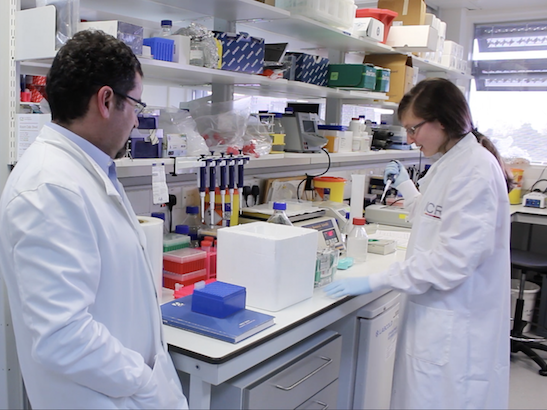Pilot study will sequence 81 cancer genes in children’s tumours to help personalise cancer treatment
Children with cancer at leading hospitals across the UK will be offered testing for genetic mutations in their tumours as part of a new initiative to begin to personalise children’s cancer treatment.
Around 400 children with solid tumours at 21 hospitals across the country will start to receive the new genetic test, which is designed to pick up key mutations in tumours that drive cancer’s growth and spread.
The initiative is the first stage of a wider programme which eventually aims to provide testing for all children with solid tumours in the UK, and to direct them into clinical trials targeting particular mutations within their tumours.
Researchers at The Institute of Cancer Research, London, and The Royal Marsden NHS Foundation Trust designed the new test, which works by sequencing 81 different cancer genes, with funding from UK charity Christopher’s Smile.
Testing will begin from 2016 and take about two years, with initial funding for the testing programme from the NIHR Biomedical Research Centre at The Royal Marsden and The Institute of Cancer Research (ICR).
Tests will first be offered to children treated at The Royal Marsden, and then to patients at any of the other 20 hospitals in the UK which form part of the Children’s Cancer and Leukaemia Group.
The initial aim will be to assess the reliability and usefulness of the test in a research setting. If testing is successful, the aim is to move testing more routinely into the clinic, to allow treating doctors to formally incorporate the results in their decisions about how patients can be most effectively treated.
The ambition is to offer children the same opportunities for personalised cancer treatment that are already increasingly becoming available for adults – to improve survival rates and reduce the level of side-effects.
The testing programme will establish which mutations occur most often in children’s tumours, and identify those that could be targeted by existing drugs for adult cancers.
Doctors will aim where possible to use the test results to match children to clinical trials of targeted cancer drugs – although maximising this potential will require more clinical trials of targeted treatments to be set up for children.
Targeted drugs can be highly effective at specifically attacking cancer cells while leaving healthy cells alone, and are likely to have fewer side-effects than standard cancer treatments.
But many of these drugs are not yet routinely available for children, in part because of difficulties in setting up clinical trials.
The new initiative will be open to children under the age of 14 with solid tumours. It will not initially include children diagnosed with blood cancers such as leukaemia unless they suffer a relapse, because these cancers respond very well to the current treatments. Nor will it include older teenagers or young adults as they experience a different spectrum of tumours to children.
Study leader Professor Louis Chesler, Professor of Paediatric Cancer Biology at The Institute of Cancer Research, London, and Consultant at The Royal Marsden NHS Foundation Trust, said:
“Children deserve the very best, modern treatments for cancer, but for too long there have been delays in applying the latest molecular techniques to personalise their treatment.
“A more comprehensive and structured approach to genetic testing to match children with cancer to specific targeted treatments could be an incredibly important step towards increasing survival. It’s exciting to be testing out this new approach to genetic testing in several hundred children with cancer, in what I hope will be a staging post towards routine use of genomic information for the care of all children with cancer in the UK.
“We still face major barriers in obtaining targeted cancer drugs for children and using them in robustly designed clinical trials. But my hope is that through this and other initiatives like it, we can help to drive forward the use of targeted drugs in children, and make the case very clearly that they should be more widely available, as they have been for adults.”
Dr David Gonzalez de Castro, Head of Molecular Diagnostics of the NIHR Centre for Molecular Pathology at The Royal Marsden and the ICR, and developer of the genetic technology used in this study, said:
“We have been using genetic profiling in adult cancers for many years in the NHS, allowing successful treatment stratification based on the biology of the tumour. We now need to bring these advances to childhood cancers and be able to design novel trials and tailor treatments using genomic medicine.”
Karen Capel, founder and trustee of UK children’s cancer charity Christopher’s Smile who funded the development of the test, said:
“There is an urgent unmet need to provide new treatments for those children diagnosed with the most aggressive and hard to treat cancers. We believe this gene sequencing test is the key ‘foundation stone’ in enabling personalised medicine for children. It will help to bring new treatments for children a step closer. We believe that children should be given access to the same tests and treatments currently available to adults.
“Christopher’s Smile has not only committed over £300,000 specifically for paediatric molecular pathology but we also campaign tirelessly at national and European levels to give children better access to the latest drugs.
“When our son died in 2008 there was no biological information available to clinicians about individual children’s tumours. This test is a first for children. Our aim is that it will change the landscape for children and open doors to potential new trials with new treatments, benefitting those children who receive the worst prognosis.”
